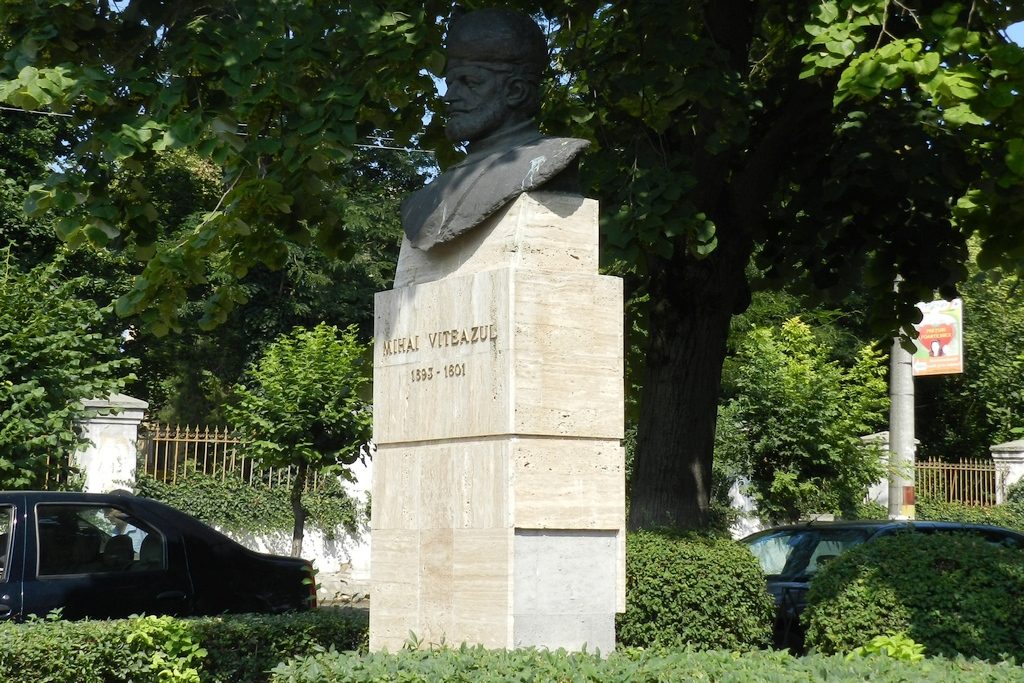

The statue from Băilești was built up in the memory of Michael the Brave.
Michael was born, most likely, in the year 1558. His mother was named Tudora. She was the sister of Iane Epirotul, who became ban of Oltenia and the representative of the prince of Muntenia at Constantinople, being a very influent person. Tudora entered in religion, by the end of the reign of his son, taking the monastic name of Teofana. She died in the year 1605 or 1606 and she was buried in the church of the monastery Cozia.
At the age of 26, Michael married Stanca and they had two children: Nicolae (sometimes he appears under the name of Nicolae – Păstrașcu) and Florica. Michael had another daughter, illegitimate, Marula, from a woman with the name of Tudora from Târgușor.
Stanca, Michael the Brave’s wife, died of plague in the year 1603 and she was buried in the church of the episcopacy from Râmnicu Vâlcea.
At the end of the year 1588 he becomes a high steward of the court of Mihnea Turcitul, and in 1593 ban of Craiova during the reign of Alexander the Bad. In September 1593, with the help of the Patriarch of Constantinople, but also with the help of the Ottomans, after paying a record amount of 1, 5 million ducats, he became Voivode of Wallachia, effectively on the 11th of October.
Being at the same time regnant in Wallachia (1593 – 1601), Transylvania (1599 – 1600) and Moldavia (1600), Michael the Brave executed for the first time in the history of Romania, the uniting of all the Romanians. In the Romanian collective knowledge he is one of the most important national heroes of Romania.
He was told “The Brave” because of the fact that he had the courage of confronting the enormous force of the Ottoman Empire from those times, but of also all the other nations temporary enemies surrounding Romania: the Hungarians, the Polish, the Tartars and the Russians.
Starting with January 1588 and until the summer of the year 1593, he will constantly climb on mandarins, from the position of ban of Mehedinți, to the one of high steward, high court marshal and high ban.
In May 1600, Michael the Brave confronts from the throne of Moldavia Ieremia Movilă, defeating him at Bacău, and, as such, he performs the first union of the Romanian countries.
The international context was unfavorable for Michael. The neighbor powers saw in his political ambitions a contradiction with the own interest of dominance. The Hapsburgs saw the fact that the plans of maintaining Transylvania were threatened in their sphere of influence, Poland didn’t want to loose the control over Moldavia, and the Ottoman Empire didn’t accept the idea of giving up Wallachia. Moreover even, the personal union of Michael represented a powerful formula, capable of changing the report of forces from the region. But, there were also internal conflicts caused by the insubordination of the Hungarian nobles of Transylvania, who didn’t accept the measures imposed by the new prince. Also, the Saxons remained hostile towards Michael, following the robberies taken by his armies in their cities and villages (Ghimbav, Codlea,Merghindeal, Cincu, Șura Mică, Cristian, Câlnic etc.). Michael doesn’t succeed in defeating the riot of the Transylvanian Hungarian nobles, supported by the general Basta at Mirăslău on the 18th/28th of September 1600 and in this way he loses the Ardeal. Shortly after, Moldavia will re-enter in the possession of the Movilești vassal to the Polish interests. Michael tries to resist against the polish attack on Wallachia, but also on this throne will be a member of the Movilești family, Simion.
